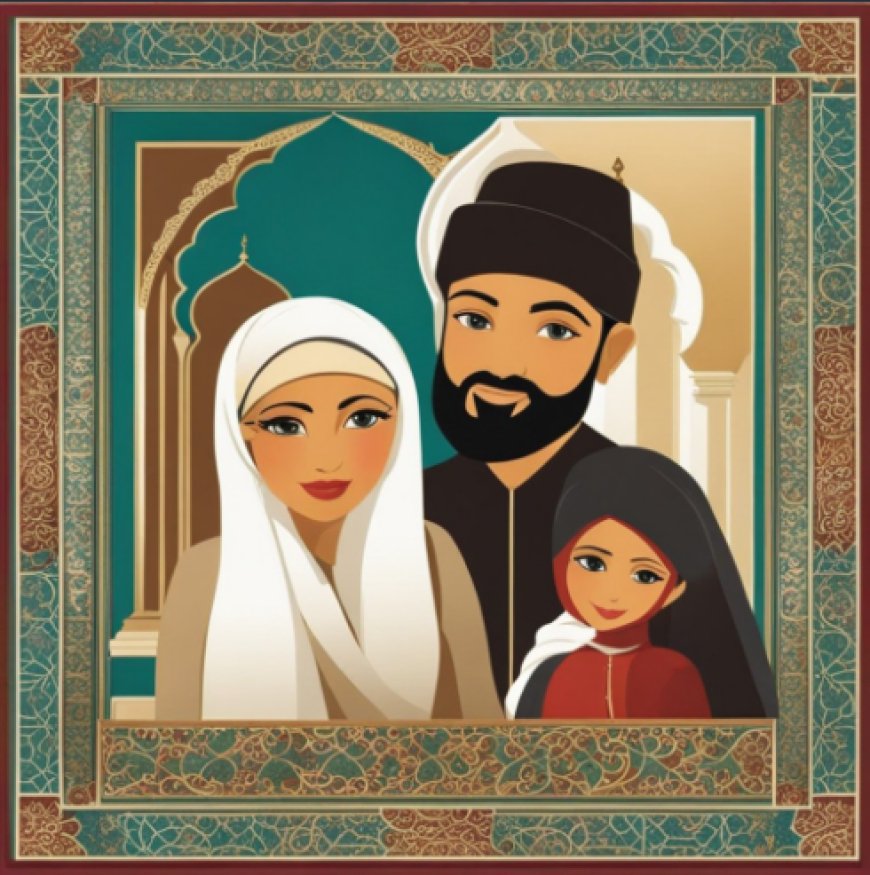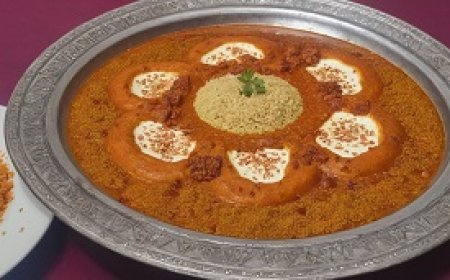Marital and Family Ethics in Islam: Building Sustainable Relationships
The ethics of marriage and family in Islam represent strong foundations for building sustainable and stable relationships. Islam encourages dealing with love, compassion, and respect within the family, considering marriage as a sacred religious institution and a significant social contract. The ethics of marriage and family include mutual respect between spouses, caring for children and elderly family members, and wise management of financial resources. By applying these values and ethics in our daily lives, we can build sustainable marital relationships that contribute to our happiness and family stability.

In Islam, marriage and family building are of great significance. Islamic ethics and values, rooted in religion, are considered the foundation for building sustainable and healthy marital relationships. Marriage in Islam is not only a legal contract but also a religious commitment that imposes a set of ethics and values on the spouses. Islam encourages the building of families on the basis of love, mutual respect, trust, tolerance, and understanding. These moral values promote effective communication between spouses and help achieve balance in the marital relationship, contributing to the establishment of a sustainable and ideal relationship based on ethics and religious principles. In this text, we will explore the importance of ethics and values in marriage and family life in Islam and how they can contribute to building marital relationships characterized by stability and happiness.
Ethics of Marriage in Islam: Foundations of the Marital Relationship
Marriage in Islam holds a significant place and is considered a fundamental pillar of an ideal marital life. The marital ethics in Islam are characterized by depth and comprehensiveness, as Islam guides couples to follow a set of values and ethics that contribute to building a healthy and sustainable marital relationship. Here are some foundations of marital relationships in Islam:
-
Effective Communication: Good communication between spouses is the cornerstone of building a strong marital relationship. Couples should listen attentively and mutually understand each other's needs and desires.
-
Mutual Respect: Spouses must respect each other, whether in opinions or decisions, and treat each other with dignity without resorting to humiliation.
-
Friendship and Love: Islam encourages building a relationship based on friendship and affection between spouses. They should be friends before being life partners.
-
Honesty and Loyalty: Spouses should be truthful with each other and uphold the commitments and promises they make.
-
Cooperation: Working together and collaborating to achieve goals and solve problems enhances marital stability.
-
Chastity and Moderation: Maintaining chastity and abstaining from excessive materialism contribute to spiritual growth and emotional strength in the marital relationship.
-
Compassion and Mercy: Spouses should exhibit compassion and mercy in their dealings, providing support to each other in difficult times.
-
Family Consultation: It is advisable to seek advice from family and friends in case of difficulties or problems in the marital relationship.
-
Balance and Equilibrium: Striking a balance between marital and personal life is essential. Couples should engage in hobbies and activities that enrich their personal lives.
-
Continuous Learning: Spouses should be open to self-improvement and learning how to deal with different stages of marital life.
In summary, marital ethics in Islam aim to build a marital relationship based on love, respect, trust, friendship, and effective communication, all of which are fundamental principles of an ideal marital life in Islam.
Mutual Respect in Marriage: Pillar of a Sustainable Relationship
Mutual respect is considered one of the most crucial values and ethics in Islamic marriage and marital relationships. It serves as a fundamental pillar for building a sustainable and healthy relationship between spouses. The significance of mutual respect in marriage can be summarized as follows:
-
Enhancing Trust: When spouses treat each other with respect, they align with constructive expectations, fostering trust in their relationship.
-
Constructive Dialogue: Mutual respect opens the door to constructive dialogue. Spouses feel comfortable expressing their thoughts and feelings without fear of criticism or neglect.
-
Respecting Individual Differences: Mutual respect entails accepting and respecting each other's personal differences, opinions, and interests.
-
Credibility and Transparency: Spouses should be honest and transparent with each other.
-
Appreciation and Esteem: Respect involves mutual appreciation and esteem for each other's efforts at work and in family care.
-
Preventing Harm and Trespassing: Spouses should refrain from using inappropriate language or behavior towards each other.
-
Supporting Goals and Aspirations: Spouses are obligated to support each other in achieving their personal and professional goals.
-
Care and Affection: Couples should treat each other with kindness and express positive feelings toward one another.
-
Privacy Consideration: Respect also encompasses maintaining privacy and not infringing on each other's rights.
-
Encouraging Personal Growth: Mutual respect encourages each partner's personal growth and development within the marital relationship.
-
Celebrating Happy Moments: Couples should share moments of joy and express their appreciation for these moments together.
In summary, mutual respect is a fundamental cornerstone for a sustainable marital relationship in Islam. It contributes to building a healthy and lasting relationship that reflects the principles of marital ethics and Islamic values.
Fulfilling Marital Promises: Lessons in Trustworthiness and Ethics
Marital commitments are considered essential values in Islamic marriage. When spouses honor and fulfill their promises, it can have a significant impact on the success and sustainability of the marital relationship. Here are some points highlighting the importance of honoring marital commitments:
-
Building Trust: Honoring commitments fosters trust between spouses. Each partner knows that the other will keep their promises, increasing the stability of the relationship.
-
Enhancing Security: Honoring commitments creates a sense of security between spouses. Each knows that their partner will always be there to support and fulfill their obligations.
-
Respecting Pacts and Pledges: In Islamic marriage, promises and commitments are sacred and must be respected and fulfilled. If one partner commits to something, it should be done with honesty and seriousness.
-
Preventing Disappointment and Frustration: Fulfilling commitments prevents disappointment and frustration. If one spouse promises to do something and fails to follow through, it can lead to problems and tension in the relationship.
-
Strengthening Communication: Honoring commitments strengthens communication between spouses. Each partner knows they can rely on the other during challenging times.
-
Flexibility and Adaptation: Sometimes circumstances change and commitments need adjustment. Spouses should be flexible and willing to adapt appropriately.
-
Shared Interests: Commitments help achieve common interests and goals in marital life.
-
Honoring Religious Promises: In Islamic marriage, commitments are made before God, making it a religious obligation to fulfill them.
-
Family Stability: Honoring commitments contributes to family stability and the marital environment.
-
Shared Responsibility: Spouses share the responsibility of upholding commitments and fulfilling them.
In conclusion, honoring marital commitments is a fundamental ethical foundation in Islamic marriage. It contributes to building a strong and sustainable marital relationship based on Islamic values and reflects the commitment of both partners to construct a healthy and enduring relationship.
Enhancing Love and Compassion in Islamic Marriage: The Role of Ethics
Love and compassion are fundamental pillars in Islamic marriage, and ethics play a crucial role in enhancing and deepening these qualities in marital relationships. Here's how ethics can promote love and compassion in Islamic marriages:
-
Friendship and Respect: Friendship and mutual respect should form the foundation of a marital relationship. Respecting each other as life partners enhances love and compassion.
-
Trust and Security: Ethics contribute to building trust between spouses. When both partners can rely on each other, a sense of security and comfort in the relationship grows.
-
Deepening the Bond: Ethics promote the development of a deep friendship between spouses, making them more emotionally connected and fostering communication.
-
Effective Listening: Ethics encourage active listening to one's spouse. When a partner feels heard and understood, the emotional bond is strengthened.
-
Flexibility and Understanding: Ethical behavior involves being flexible and understanding towards each other's needs and goals.
-
Providing Emotional Support: Ethics promote providing emotional support during difficult times, sharing both sorrows and joys.
-
Appreciating Inner Beauty: Ethics emphasize that inner beauty is more important than outward appearances, encouraging genuine respect and appreciation between partners.
-
Modesty and Chastity: Ethical values encourage modesty and chastity in marital relationships, contributing to increased compassion and love.
-
Maintaining Sustainability: Ethics help in sustaining love and compassion over time, ensuring their long-term presence in the marriage.
-
Tolerance and Forgiveness: Ethical principles teach the importance of tolerance and forgiveness in marital relationships. These qualities enable couples to overcome challenges and build love and compassion.
In conclusion, ethics can serve as a vital foundation for enhancing love and compassion in Islamic marriages. When couples embrace the right values and ethics, they can build a sustainable, ideal marital relationship based on love, compassion, and mutual respect.
Ethical Childrearing in Islam: Building a Sustainable Family
Teaching children in Islam is an integral part of building a sustainable and ideal family. Teaching morals and values to children revolves around religion and Islamic ethics, forming a vital foundation for building a sustainable family. Here's how to achieve that:
-
Religious Education: Parents must provide religious education to their children from a young age. This includes teaching them about prayer, the Quran, the Sunnah (traditions of the Prophet), and other Islamic values.
-
Setting a Good Example: Parents should be a good example for their children in their behavior and ethics. Children learn a lot by observing their parents' conduct.
-
Engaging in Charitable Work: Teaching children the value of helping the poor and needy enhances their sense of humility and compassion.
-
Promoting Justice: Parents should teach their children about justice and equality, treating everyone fairly and without discrimination.
-
Developing Personal Ethics: Emphasizing personal ethics such as honesty, sincerity, and moderation.
-
Instilling Acts of Kindness: Parents should teach their children the art of kindness and how to treat others with kindness and care.
-
Teaching the Concept of Accountability: Children should be aware that Allah watches over them at all times, encouraging them to engage in righteous acts.
-
Educating about Family Life: Children should be made aware of the importance of family and the role of each member within it.
-
Social Responsibility: Teaching children the concept of social responsibility and the rights of others.
-
Fostering Independence: Promoting independence and making the right decisions based on Islamic values.
-
Chastity and Modesty: Teaching children the values of chastity, modesty, and mutual respect.
Building a sustainable family requires a dedication to imparting Islamic ethics to children and guiding them on the right path. Reinforcing these values will contribute to the creation of a cohesive and sustainable family rooted in Islamic ethics and values.
Tolerance and Forgiveness in Marriage: The Ethics of Peaceful Conflict Resolution
Tolerance and forgiveness are essential aspects of the ethics of marriage in Islam. These Islamic values promote peaceful conflict resolution and contribute to building sustainable marital relationships. Here's how tolerance and forgiveness can play a vital role in resolving conflicts within marriage:
-
Friendship and Love: Tolerance relies on the strength of friendship and genuine love between spouses. When both partners genuinely love and trust each other, they are more willing to be tolerant and forgiving during conflicts.
-
Mutual Respect: Tolerance is rooted in mutual respect between spouses. When each person respects the feelings and opinions of the other, open and constructive dialogue can be part of the solution.
-
Effective Communication: Open and effective communication is a fundamental tool for conflict resolution. Spouses should speak openly about their issues and listen carefully to understand each other's perspectives.
-
Forgiveness and Reconciliation: Forgiveness is a significant aspect of tolerance. Spouses should be able to forgive mistakes and offenses, allowing for a fresh start in the relationship.
-
Seeking Constructive Solutions: The spouses should seek constructive solutions to conflicts rather than resorting to revenge or negative experiences.
-
Understanding and Friendship: When you have the ability to understand your partner's feelings and vulnerabilities, it can help provide support and build a stronger relationship.
-
Friendship: Friendship is also a critical part of marriage. When you feel that your spouse is a close friend, your relationship can be more sustainable and better equipped to handle conflicts.
-
Religious Guidance: In many cases, seeking advice from a religious leader or marriage counselor can guide couples toward balanced and ethical solutions.
Tolerance and forgiveness in marriage can be powerful drivers for building a sustainable and ideal marital relationship. When spouses practice these Islamic values, they can successfully overcome conflicts and elevate their relationship to higher levels of strength and love.
Effective Communication Between Spouses: Its Foundations and Ethics
Effective communication between spouses is a fundamental element in the success of married life, contributing to security and happiness. This communication relies on specific foundations and ethical principles that enhance mutual understanding and maintain a healthy and sustainable relationship. Here is an overview of the most important foundations and ethical principles of effective communication between spouses:
-
Mutual Respect: Effective communication begins with mutual respect between spouses. They should respect each other's opinions and feelings without resorting to insults or belittling.
-
Friendship and Trust: Spouses should build a strong foundation of friendship and mutual trust. Friendship promotes natural communication and makes partners feel comfortable discussing various issues.
-
Active Listening: Spouses should be able to listen carefully to what their partner is saying without interruption or negative judgment. Active listening helps better understand each other's needs and desires.
-
Honesty and Transparency: Couples should have the ability to speak honestly about their feelings and needs without fear of criticism or judgment.
-
Remaining Calm: When conflicts or disagreements arise, spouses should deal with them calmly and without resorting to anger or emotional escalation.
-
Understanding and Empathy: Spouses should demonstrate understanding and empathy towards each other's feelings and needs, fostering closeness and harmony.
-
Flexibility: Effective communication requires flexibility and the ability to adapt to changes in the marital relationship without stubbornness or violence.
-
Building on Positives: Couples should focus on enhancing positive aspects of the relationship and work together to achieve common goals.
-
Maintaining Romance: Love and romance should remain part of the marital relationship to keep passion and closeness alive.
-
Utilizing Social Support: Spouses can seek support from family and friends or engage in social activities to strengthen their relationship.
Effective communication between spouses is the foundation of a sustainable and happy married life. By following principles of mutual respect, friendship, and honesty, couples can overcome difficulties and build a marital relationship based on trust and mutual love.
Economic Ethics in Islamic Marriage: Managing Finances and Resources
Economic ethics are considered an essential component of Islamic marriage, playing a significant role in managing finances and resources between spouses. Adherence to values and ethics in this context enhances the stability of marital life and contributes to the construction of a healthy and sustainable relationship. Here is a detailed discussion on economic ethics in Islamic marriage:
-
Justice and Equality: Spouses should treat each other fairly when it comes to financial matters. This means making financial decisions jointly and impartially without favoring one partner over the other.
-
Transparency: Couples should be transparent with each other regarding financial matters, sharing financial information honestly and without concealment.
-
Consultation: It is advisable for spouses to consult with each other on significant expenses and financial investments. This helps foster understanding and reach mutual agreements.
-
Saving and Frugality: Couples should learn the importance of saving and avoiding reckless spending. Conserving finances helps secure a better financial future.
-
Honesty and Integrity: Spouses should be honest in their financial commitments and fulfill their obligations towards each other.
-
Charity and Philanthropy: Couples can engage in acts of charity and help those in need continuously. This reflects Islamic values of benevolence and sharing wealth.
-
Financial Planning: Couples should establish a financial plan that includes short-term and long-term financial goals and how to achieve them.
-
Avoiding Usury (Riba): Spouses should steer clear of usury and interest-bearing loans, as they are considered forbidden (haram) in Islam.
-
Family Values: Spouses should impart sound economic values to their children, teaching them about saving and financial responsibility.
-
Trust and Cooperation: Trust between spouses plays a significant role in jointly managing finances. Building trust is accomplished through cooperation and understanding.
In summary, economic ethics in Islamic marriage promote understanding and financial security between spouses. Religious values play a crucial role in guiding them towards sound financial management, contributing to the construction of a happy and sustainable marital life.
Emotional and Psychological Stability in Marriage: The Importance of Healthy Ethics
Emotional and psychological stability is a vital component of a successful and fulfilling marriage. Within the context of Islamic marriage, adhering to ethical principles related to emotions and mental well-being is essential for maintaining a healthy and harmonious relationship. Here, we delve into the significance of emotional ethics in fostering emotional and psychological stability in marriage:
-
Empathy and Compassion: Spouses should cultivate empathy and compassion toward each other's emotional needs. Understanding and sharing in each other's joys and sorrows build a strong emotional connection.
-
Communication: Effective communication is key to resolving conflicts, expressing emotions, and ensuring both partners feel heard and valued. Listening actively and speaking respectfully are essential components of ethical communication.
-
Patience and Tolerance: Marriage inevitably involves challenges and differences. Spouses should exercise patience and tolerance in dealing with each other's shortcomings, showing kindness and understanding.
-
Trust and Honesty: Trust is the foundation of any strong relationship. Both partners should be trustworthy and honest in their dealings, providing emotional security to each other.
-
Forgiveness: Forgiveness is a virtue highly regarded in Islam. Couples should be willing to forgive each other's mistakes and past transgressions, promoting emotional healing and growth.
-
Respect and Dignity: Respecting each other's opinions, feelings, and boundaries is essential. Mutual respect preserves each partner's dignity and self-esteem.
-
Gratitude: Expressing gratitude for each other's presence and contributions fosters a positive emotional environment. Recognizing and appreciating the little things can go a long way.
-
Conflict Resolution: Learning healthy ways to address conflicts without resorting to harmful behaviors or words is crucial. Couples should work together to find mutually satisfactory solutions to their differences.
-
Emotional Support: Providing emotional support during challenging times is a moral obligation. Spouses should be each other's pillars of strength, offering comfort and reassurance.
-
Mental Health Awareness: Recognizing the importance of mental health and seeking help when needed is a sign of emotional maturity. Encouraging mental well-being within the marriage is essential.
-
Balancing Personal Space: While marriage involves togetherness, it's also vital to respect each other's need for personal space and individual pursuits.
In conclusion, emotional and psychological stability in marriage is closely tied to adhering to ethical principles. Cultivating emotional ethics leads to a deeper emotional connection, increased trust, and overall marital contentment. These ethics form the moral framework that helps couples weather the challenges of married life and build a strong, enduring bond.
Ethics of Caring for the Elderly in Islamic Families: Duties and Care
Family holds great significance in Islam, serving as the cornerstone of building a strong and morally sound community. Within the family structure, elderly members, who deserve special attention and care, are of paramount importance in line with Islamic ethics. Here is an overview of the ethics involved in caring for the elderly in Islamic families:
-
Respect and Dignity: It is imperative for family members to treat the elderly with respect and dignity. They should be treated gently, showing deep respect for their experience and advanced age.
-
Caring and Provision: Families must attend to the physical and emotional needs of the elderly. This includes providing necessary healthcare and ensuring their comfort and happiness.
-
Assistance in Daily Tasks: The elderly may, at times, require assistance with daily tasks such as mobility or personal care. Family members should readily provide assistance without hesitation.
-
Honesty and Transparency: Families should be honest and transparent with elderly members, especially concerning financial matters and health issues. This helps them make informed decisions.
-
Consultation and Engagement: The elderly should be allowed to participate in family decisions and be consulted on important matters. This fosters their sense of belonging and contribution.
-
Patience and Endurance: Families may encounter challenges when caring for the elderly, such as chronic illnesses or changes in behavior. It is essential to show patience, endurance, and a loving approach when dealing with these challenges.
-
Prayer and Compassion: Families can pray for the health and happiness of their elderly members and wish them mercy and blessings. Prayer is a significant act of worship in Islam.
-
Effective Communication: Consistent and effective communication with the elderly strengthens their sense of belonging and enables them to express their needs and feelings.
-
Appreciation and Gratitude: Family members should express appreciation and gratitude towards the elderly for their contributions to the family over the years.
-
Entertainment and Enjoyment: Families should provide opportunities for the elderly to enjoy their preferred activities and spend quality time with them.
These ethics of caring for the elderly in Islamic families contribute to building strong and sustainable relationships with this respected demographic. They reflect Islamic values and morals and reinforce family unity, creating a society founded on care and solidarity.
In conclusion
It is evident that the ethics of marriage and family in Islam play a crucial role in building sustainable and healthy relationships. By adhering to Islamic values and morals, couples can establish marital relationships characterized by love, mutual respect, trust, and tolerance. These values promote effective communication between spouses and contribute to achieving balance in married and family life. The ethics of marriage in Islam reflect profound values that enhance family happiness and stability, and they contribute to building a more prosperous and peaceful society. Therefore, it is essential for couples to commit to these ethics and apply them in their marital lives to ensure the construction of sustainable and ideal relationships grounded in Islamic values.
What's Your Reaction?

















































































































